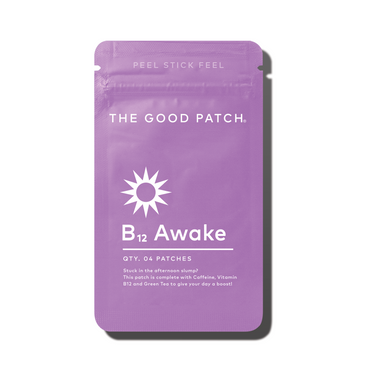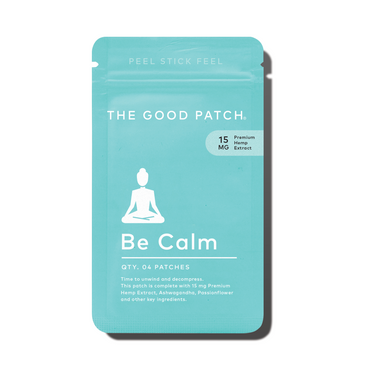We've all had those days where everything seems to go wrong. You wake up late and can't find your keys, traffic is a nightmare, coffee spills on your shirt, and you're already late for your high-stress job. It's natural to feel stressed out during these particularly trying days, but there are plenty of ways to stay positive and remain productive in stressful situations.
And while this is likely an interview question you’ve heard before, it’s an important one to consider. How do you handle stress management? Do you need some practical tips?
The Good Patch has your back! Read on to discover some strategies that you can use to help you chill out and keep your stress in check.
What Causes Stress?
Stressful days are an unfortunate reality for many of us. They can be caused by several factors and can majorly impact our overall well-being, both mentally and physically — not to mention the rise in blood pressure.
While stress can be a perfectly normal and healthy motivator in certain situations, it can also become debilitating when left unchecked. With this in mind, it's important first to understand the causes of stress to manage it effectively.
External Factors
One major cause of stress is external factors, like your job or other important responsibilities. Stressful jobs often involve long hours, conflicting demands, tight deadlines, and high levels of responsibility.
If you constantly feel overwhelmed at work or school, this could be a sign that you're experiencing too much stress. Additionally, financial issues like debt or lack of money can also cause significant amounts of stress. Trying to juggle bills and make ends meet can burden you tremendously.
Interpersonal Relationships
Another source of stress is interpersonal relationships with other people. Whether it's dynamics between family members, a romantic partner, or team member, conflicts in your work environment, relationships can be difficult and complex, often bringing about feelings of worry and emotional distress.
Even if things are going well with someone, the fear of losing them or their approval can still increase our stress levels.
In addition to these interpersonal stressors, social situations such as public speaking engagements may also trigger feelings of fear and apprehension for some people, leaving them feeling overwhelmed by the pressure that comes with being in front of a crowd.
Internal Factors
Finally, internal factors such as physical health issues may contribute to increased stress levels in our lives — especially if they have been caused by prolonged exposure to stressors (like those mentioned above).
Chronic pain, exhaustion from lack of sleep, or malnutrition due to poor eating habits can all take their toll on our mental and physical health. As a result, extreme fatigue and heightened emotions can manifest into even more intense levels of distress if not properly managed and addressed.
How Can I Decompress on Stressful Days?
Stressful days can be overwhelming and leave us feeling drained, depleted, and sometimes helpless. But no matter how tough the day may seem, you can do a few things to help combat stress and find some peace.
Here are a few tips and tricks to help manage those especially stressful days:
1. Take a Break From Technology
Technology can be beneficial and detrimental to stress levels. If you feel overwhelmed by emails, notifications, deadlines, or messages from social media, it's important to unplug for a little while.
Taking a step back from technology will give you time to process what is happening in your life while reducing the noise coming at you from all directions. Building your soft skills through connection IRL rather than on a screen can give you the tools you need to handle tough days with ease.
2. Connect With Nature
Nature has a way of calming us down and helping us regain our equilibrium in moments of distress. Even if you don't have access to an outdoor space, simply looking out the window at trees or bushes can help ease tension and allow your mind to find a more balanced and positive attitude..
Pro Tip: Before heading outside to enjoy Mother Nature, put on our Be Calm Patch — infused with plant-powered ingredients like Ashwagandha and Passion Flower, just one patch is all you'll need to find calm.
3. Exercise
Exercise releases endorphins that make us feel good, triggers relaxation responses within our body, reduces symptoms of worry, increases our energy levels, and helps us focus on something positive. In other words, working out is a surefire way to fight stress!
Any type of physical activity that makes you sweat is ideal for reducing stress; try walking around the block or doing some yoga. Just don't forget to stay hydrated by drinking plenty of H2O.
4. Get Quality Sleep
Proper sleep is essential in maintaining mental health during stressful times because it helps reduce fatigue and gives our bodies the rest they need to stay energized throughout the day.
Aim for seven to nine hours of quality shut-eye per night — this will help ensure that your body gets enough restorative sleep to keep up with life's daily problem-solving without feeling burnt out by midday!
Pro Tip: Struggling to summon the Sandman? Catch some ZZZs with our Nite Nite Patch. Simply open, peel, and stick to let the sweet dreams roll.
5. Practice Deep Breathing
Deep-breathing exercises are one of the quickest ways to calm down when feeling overwhelmed or anxious; they encourage mindful awareness while allowing oxygen into your body, bringing clarity and balance during times of stress.
There are many different breathing related relaxation techniques (such as belly breathing, pursed lip breathing, and lion's breath), so do a little research to find one that works best for you!
6. Journal Your Thoughts
Writing down your worries is therapeutic not only because we get them off our minds but also because seeing our thoughts written down helps us see them objectively instead of allowing them to spin around in our heads unchecked. Raising our self awareness can allow us to find balance when big emotions show up.
Investing even just 20 minutes per day jotting down your feelings or thoughts can work wonders in helping to reduce stress levels overall.
7. Prioritize Self-Care
Don't forget to prioritize self-care during these challenging moments; spend time doing activities that bring joy and fulfillment, such as taking a stroll outside, soaking in a warm bubble bath, or listening to your favorite music tracks.
A little bit of 'me time' is essential for recharging our batteries and regaining emotional balance during difficult periods of life. While it can feel like time management is all about productivity, creating space to care for yourself will ultimately lead to efficiency in the end.
8. Try The Good Patch
Whether you're on a mission to decompress or just take the edge off after a long week, the Good Patch can help! Our wearable wellness patches deliver sustained benefits for 8 to 12 hours.
From supporting a good night's rest to bringing on the chill vibes, our plant-powered patches will help you to feel your best. Simply peel, stick, and you're good to relax.
9. Reach Out for Support
When feeling overly stressed or anxious, it's important to reach out for support from friends or family — socializing has been proven effective in managing mental health issues as it encourages connection with others, which can lead to increased self-esteem and happiness over time!
Takeaways
Stressful days can be overwhelming, but with the right strategies, they can be easier to manage. Taking the time to understand the root cause of the stress, unwind, connect with nature, prioritize self-care, and catch quality ZZZs all help in reducing stress.
With the right approach — and The Good Patch in your corner — stressful days can be easier to manage.
Sources:
Daily Life | The American Institute of Stress
Spend Time in Nature to Reduce Stress and Anxiety | American Heart Association
Exercise and stress: Get moving to manage stress | Mayo Clinic
How Much Sleep Do I Need? | CDC
How to Relieve Stress: Breathing Exercises You Can Do Anywhere | JED
Journaling for Mental Health - Health Encyclopedia | University of Rochester Medical Center
Health Benefits of Social Interaction | Mercy Medical Center







